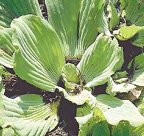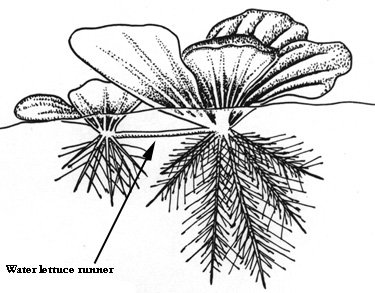Water
Lettuce
Pistia
stratiotes

|
Water lettuce
is a
floating plant that grows in lakes, rivers
and canals, and in warmer climates, occasionally
forming large dense mats of bright green
plants.
Experts disagree
as to whether water lettuce is a U.S. native
plant or has been introduced, but if introduced,
it was quite a while ago, the earliest reference
in Florida was in 1765.
|

varamey@nervm.nerdc.ufl.edu
Copyright 1997 University of Florida
How
To Identify Water Lettuce
Water
lettuce is a free-floating plant. As its name
implies, water lettuce resembles a floating open
head of lettuce. Water lettuce has very thick
leaves. The leaves are light dull green to blue-green,
are hairy, and are ridged. There are no leaf stalks.
Water lettuce roots are light-colored and feathery.
Its flowers are inconspicuous.
Water lettuce reproduces
vegetatively by short runner stems (stolons) that
radiate from the base of the plant to form daughter
plants, and also reproduces by seed.
How
to grow Water Lettuce
If
given plenty of sun in a pool with fish to fertilize
it, and a water temperature warmer than 70°F,
water lettuce will grow up to 15 inches in diameter,
and produce plenty of daughter plants. With
a start of three plants in the spring, they can
produce enough plants to completely cover
a 10 foot by 12 foot area by mid summer.
Back
to Floating Plants Page


